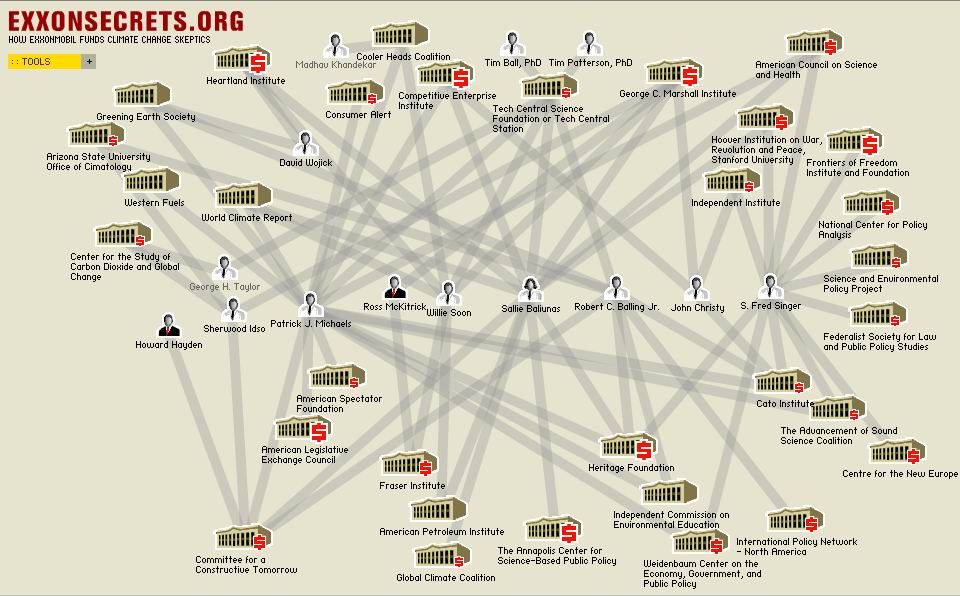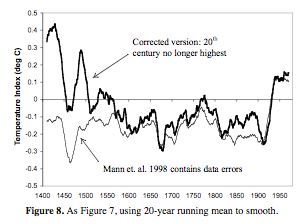DAR
Much more background on Tim Ball, Friends of Science and this bunch. From the Toronto Globe and Mail. Nice and fresh.
***
Mr. Cool & friends
Former geography professor Tim Ball is Canada's most vocal climate change skeptic. Supporting him is a coalition of oil patch retirees, skeptical scientists, anonymous donors and public relations experts intent on quashing the Kyoto Accord.
(Globe and Mail, Aug. 12, '06)
On a cloudless morning in June, Tim Ball has joined a hundred-odd members of the Comox Valley Probus Club for a buffet of coffee, cinnamon buns and pink lemonade. As this group of retired business people wraps up its monthly meeting, Prof. Ball surveys the crowd and runs a hand over his suntanned dome.
He does not appear the least bit fatigued, which is remarkable considering that the 67-year-old former University of Winnipeg professor has spent much of the last couple of months crisscrossing the country, addressing community forums, business groups, newspaper editorial boards and politicians about climate change. He has been nearly as dogged as Al Gore, whose own globe-hopping slide show is the subject of the documentary film, An Inconvenient Truth.
But that is where the similarity between them ends.
Prof. Ball clutches a cordless microphone and smiles out at the sea of white hair. He teases the audience about their age, throws in a hockey joke, then tells the crowd that, unlike Mr. Gore, he is a climatologist, and he is not at all panicking about climate change.
"The temperature hasn't gone up," he asserts. "But the mood of the world has changed: It has heated up to this belief in global warming."
Over the next hour, Prof. Ball stitches together folksy anecdotes with a succession of charts, graphs and pictures to form a collage of doubt about the emerging consensus on climate change. There's a map of Canada covered in ice 20,000 years ago - proof, he says, that wild swings in the earth's temperature are perfectly normal. There's a graph suggesting that atmospheric carbon dioxide is at its lowest level in 600 million years.
Gaining momentum, he declares that Environment Canada and other agencies fabricated the climate-change scare in order to attract funding for propaganda and expensive attempts to model climate change using supercomputers.
"Environment Canada can't even predict the weather!" he bellows. "How can you tell me that they have any idea what its going to be like 100 years from now if they can't tell me what the weather is going to be like in four months, or even next week?"
As proof of the climate-change conspiracy, Prof. Ball shows the crowd a graph with a kinked line jigging across it. This is the famous "hockey-stick graph" published by Pennsylvania State University scientist Michael Mann and his team in 1999, which shows temperatures to be fairly stable for hundreds of years, then rising rapidly in the last few decades. Al Gore, among many others, uses it to illustrate the case for global warming.
Prof. Ball claims that the Mann team "cooked the books," and that its blunders were confirmed just a few days previously, in a report to the Congress by the U.S. Academies of Science. "He threw out all the data that didn't fit his hypothesis," Prof. Ball says, without offering evidence to back the charge. His outrage is now as searing as the baking-hot sun outside. "I personally think [Mann] should be in jail!"
In fact, Prof. Ball says, the real danger for Canada is not warming, but cooling: "It's like Y2K," he concludes. "We all just need to calm down."
He is met with raucous applause. It is as though a weight has been lifted from the audience's collective shoulders: What a relief to learn that this global crisis, one they keep hearing will bring extreme weather, submerge small island nations and devastate economies, may be nothing to worry about.
Few in the audience have any idea that Prof. Ball hasn't published on climate science in any peer-reviewed scientific journal in more than 14 years. They do not know that he has been paid to speak to federal MPs by a public-relations company that works for energy firms. Nor are they aware that his travel expenses are covered by a group supported by donors from the Alberta oil patch.
Most Canadians recognize, of course, that fossil-fuel businesses could lose large sums if the federal government moves to curtail greenhouse-gas emissions.
But they may not realize that by quietly backing the movement behind maverick figures such as Prof. Ball, the fuel industry - with its close ties to the party that brought Prime Minister Stephen Harper to power - is succeeding, bit by bit, in influencing both public opinion and Canadian policy on global warming, including the international Kyoto Accord.
An Ipsos Reid poll released in May found that, despite increasing scientific evidence to the contrary, four of every 10 Canadians surveyed still agreed with Prof. Ball's assertion that climate change is due to natural warming and cooling patterns.
"He is a very entertaining performer, very slick," says Neil Brown, the Conservative MLA for Calgary-Nose Hill, who attended a presentation Prof. Ball made to a caucus of provincial Tories in Calgary. "When someone shows up and tells me that the earth is actually cooling, then it gets my attention."
[-bugs-]
The scientific mainstream is unequivocal that global warming is real, happening at a rate unprecedented in human history, and most likely caused mainly by human greenhouse-gas emissions. Last year, the national academies of science of all the G8 nations, representing most scientists in the developed world, sent a joint message to their leaders urging prompt action.
In February, the UN and the World Meteorological Society's Intergovernmental Panel on Climate Change (IPCC), which brings together more than 2,000 scientists to review tens of thousands of peer-reviewed papers on climate science, will release its fourth report. The authors say it will contain a warning that human-caused global warming could drive the Earth's temperature to levels far higher than previously predicted.
Andrew Weaver is the Canada Research Chair in Climate Modelling and Analysis at the University of Victoria, and a lead author of a chapter in the upcoming IPCC report. He gives a frustrated sigh at the mention of Tim Ball's cross-country tour.
"He says stuff that is just plain wrong. But when you are talking to crowds, when you are talking on TV, there is no challenge, there is no peer review," Prof. Weaver says.
Like other senior scientists, he charges that Prof. Ball's arguments are a grab bag of irrelevancies and falsehoods: "Ball says that our climate models do not [account for the warming effects of] water vapour. That's absurd. They all do."
Likewise, he says, Prof. Ball's claims that climate change could be explained by variations in the earth's orbit or by sunspots are discounted by widely available data.
Many of Prof. Ball's other arguments don't stand up to scrutiny. Consider the hockey-stick graph: He was right that the U.S. Academies of Science had delivered a review of climate science to Congress. But their report concluded that temperatures in the last 25 years really have been the highest in 400 years. Moreover, the panelists assured reporters that there was no evidence at all that the Mann team cherry-picked its data - completely contradicting what Prof. Ball told his audience in Comox.
"What Ball is doing is not about science," says Prof. Weaver. "It is about politics."
Leaders throughout Europe have accepted the IPCC position on climate change, and have been looking for ways to take collective action, primarily via the Kyoto Accord. Yet North Americans have lagged behind, hamstrung by a lingering debate in the media and among politicians about climate science.
How did this doubt take hold?
In a now-infamous 2003 memo, U.S. pollster and consultant Frank Luntz advised Republican politicians to cultivate uncertainty when talking about climate change: "Voters believe that there is no consensus about global warming within the scientific community. Should the public come to believe the scientific issues are settled, their views about global warming will change accordingly. Therefore, you need to continue to make the lack of scientific certainty a primary issue in the debate ," wrote Mr. Luntz (the italics are his own).
Nurturing doubt about climate-change science has become big business for public-relations companies and lobbyists south of the border. Between 2000 and 2003, ExxonMobil alone gave more than $8.6-million (U.S.) to think tanks, consumer groups and policy organizations engaged in anti-Kyoto messaging, according to the company's own records. Those groups promote the minority of scientists who still dispute the IPCC consensus on climate change, creating the appearance of widespread scientific disagreement.
Mr. Luntz met with Prime Minister Harper in May, but the Conservatives already had adopted his advice. Mr. Harper was emphasizing that climate change was but an "emerging science" long before he cancelled an array of programs designed to promote energy conservation.
Environment Minister and Edmonton-Spruce Grove MP Rona Ambrose, for example, has talked up the flaws of the Kyoto Accord, while steadfastly rejecting its modest emission-reduction targets. And on June 30, the government simply disappeared its main climate-change web site
(
www.climatechange.gc.ca ), which once contained educational materials for teachers.
However, given the resonance of the climate-change issue with most Canadians, political leaders can't afford to denounce mainstream science too loudly. That task has instead been taken up by activists in the Conservative Party's Alberta heartland.
Over the past four years, a coalition of oil-patch geologists, Tory insiders, anonymous donors and oil-industry PR professionals has come together to manufacture public consent for Canada's withdrawal from Kyoto. Through a Calgary-based society ironically dubbed the Friends of Science, they have leveraged Tim Ball and a handful of other "climate skeptics" onto podiums and editorial pages across the country.
While the federal government stalls, the skeptics preach doubt, softening the public for a diluted "Made-in-Canada" climate policy. Prof. Ball admits that when he meets with business leaders and politicians,he advises them to weigh the high price of action against more cost-effective "lip service."
These efforts may help delay emissions caps for years. Not bad for a campaign that began with a bitch session among a clutch of oil-patch retirees.
***
MUCH MORE HERE





